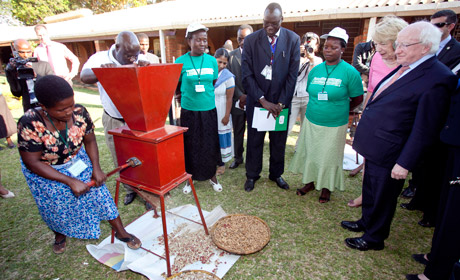President Higgins visits International Crops Research Institute, Malawi
13/11/14
President Higgins and his wife Sabina viewing a groundnut shelling machine at the International Crops Research Institute.
Science week in Africa with President Higgins
This week (9-16 November) is Science Week, and yesterday, President Higgins visited Chitedze agricultural research centre in Malawi.
The President toured the research centre, and saw the work being done to combat poverty and hunger by boosting agricultural productivity and diversification. He also met with smallholder farmers and members of the Malawi Seed Industry Group. His visit highlights how Irish Aid is supporting science and technology to aid development.
Since 2009, Irish Aid has supported partners in Malawi to develop successful agriculture-led approaches that effectively address rural poverty.
Since 2009, Irish Aid has supported partners in Malawi to develop successful agriculture-led approaches that effectively address rural poverty. One such example is Irish Aid’s partnership with the International Crops Research Institute for the Semi-Arid Tropics (ICRISAT) on the Malawi Seed Industry Development Programme.
The programme brings together ICRISAT, seed companies, commercial farmers, contracted seed “out-growers” and NGOs, with the aim of increasing certified seed production. Consequently seed production has increased from 290 tonnes in 2010 to over 2,500 tonnes in 2013, and has greatly improved seed quality and availability, particularly groundnut seeds.
The programme now has 17 local seed company partners, up from five in 2008. The seed development programme also supports a wide network of smallholder seed out-growers, who have seen their seed production incomes rise over the last five years. It has also been instrumental in developing a seed brand (with the relevant quality control measures) to give smallholder farmers the assurance of quality.
The programme’s success has attracted the attention of other donors, and Irish Aid and ICRISAT are now exploring how potential additional support might be harnessed to upscale the programme and roll it out across the country, making high quality seeds readily and easily available to all farmers.
Irish Aid used a similar model in partnership with the Potato Research Institute (CIP), to produce high quality Irish potato and orange fleshed sweet potatoes in Malawi.
The availability of good quality seeds is one the major obstacles to increased food production and food security in African countries. The vast majority of smallholder farmers struggle to access high quality affordable seed, which they can rely on to provide a good harvest and income.
These two programmes are good examples of government, research, private sector, civil society and donors such as Irish Aid working together through science to deliver quality seeds and tubers to smallholder farmers across Malawi.

